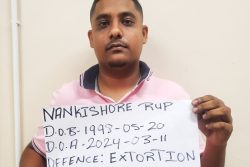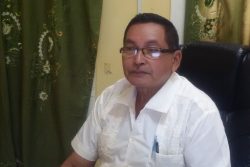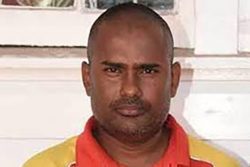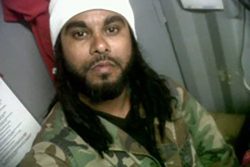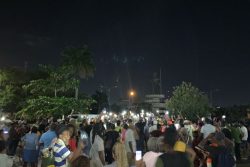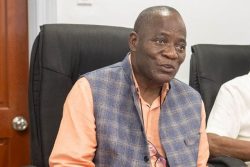Amid a week-old row over the seizure by Venezuela of an oil exploration vessel in Guyana’s waters, technical teams from Georgetown and Caracas are to meet in four months to address maritime delimitation.
This was one of the key points agreed by the delegations from the two countries at a meeting in Port-of-Spain, Trinidad and Tobago yesterday. A joint statement to this effect was issued last night. A separate statement from the Guyana Ministry of Foreign Affairs last night said
“With specific regard to the release of the crew and the vessel (Teknik Perdana), Minister (Carolyn) Rodrigues-Birkett said `based on information provided by the judicial authorities , the crew and vessel is expected to be released within the coming hours.’” It had been reported from Caracas earlier in the week that the crew and Malaysian vessel had been released. There was no mention in either the joint statement or the ministry’s statement on the fate of the captain, Ukrainian Igor Bekirov. He was this week charged by Caracas with breaching a security zone.
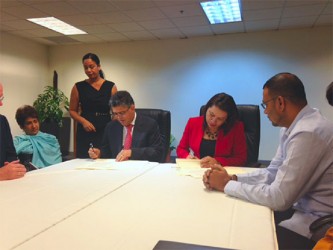
The hastily arranged meeting yesterday followed consternation in Georgetown over the seizure of the vessel which had been indirectly contracted by US oil explorer Anadarko. The arresting of the vessel ran counter to the line that current Venezuelan President Nicolas Maduro had taken in a visit to Guyana several weeks ago.
With a meeting scheduled in four months, observers say there was nothing in the joint statement last night which suggested that Anadarko would be able to continue its seismic work unhindered in this area. The observers say this could definitely freeze future oil search activities in the offshore Roraima block in the western waters of Guyana.
The joint statement said that the two ministers met on the instructions of their Presidents with the “aim of advancing the bilateral political dialogue in light of the recent event.”
The statement said that the Ministers voiced their satisfaction over the excellent relations which have developed between the two nations under the Presi-dency of Donald Ramotar and Nicolas Maduro Moros. In this regard, the joint statement said that they reiterated that dialogue and cooperation are the means for a peaceful solution of differences between States.
According to the statement the Ministers ratified all the points of the Joint Declaration of September 30, 2011 in Port of Spain, signed by Rodrigues-Birkett and the then Minister of the People’s Power for External Relations of the Bolivarian Republic, Maduro, “where they recognised that the delimitation of the maritime boundaries between their two States remains an outstanding issue and agreed that such delimitation will require negotiations. In this regard, Ministers Rodrigues-Birkett and (Elias) Jaua agreed to explore mechanisms within the context of international law to address the issue of maritime delimitation. To this end, they agreed that a technical team would meet within four months to exchange views on how such delimitation could proceed. The need to pursue the line of the 2011 talks had been stressed in yesterday’s edition of Stabroek News by former Minister of Foreign Affairs, Rashleigh Jackson.
Those who accompanied Rodrigues-Birkett to the talks were Robert Persaud, MP, Minister of Natural Resources and the Environment; Elisabeth Harper, Director General, Ministry of Foreign Affairs; Ambassador Rudolph Collins; Adviser Keith George; Guyana’s Ambassador to Suriname, Audrey Jardine Waddell, Guyana’s Ambassador to UNASUR and Newell Dennison, Deputy Commissioner (Technical), Guyana Geology and Mines Commission.
Stabroek News understands that the meeting was originally slated to convene at 2pm, but did not begin until sometime after 4pm and lasted approximately six hours yesterday.
Guyana has been adamant that the ship was intercepted in this country’s 200-mile Exclusive Economic Zone (EEZ). The 36-man multinational crew were on the Malaysian-owned (Sapura-Kencana Petroleum) and the Panamanian registered oil survey vessel was carrying scientists from the Texas-based researcher TDI-Brooks International and was contracted out by Anadarko Petroleum to carry out seismic surveys in Guyana’s EEZ. The ship was intercepted by a Venezuelan naval vessel, the Yakuana, then ordered and escorted to the island of Margarita. Since the incident both Guyana and Venezuela expressed their disappointment over the handling of the situation with Guyana noting that it could be a serious threat to peace and Venezuela stating that an explanation was in order from Guyana as to why permission was granted for scientific prospecting and exploration of the continental shelf.
The meeting in 2011 between Rodrigues-Birkett and Maduro was convened following criticism in Venezuela about the Guyana application for an extension of its continental shelf.
In the statement following that meeting, Rodrigues-Birkett and Maduro said that “In discussing Guyana’s submission to the Commission on the Limits of the Continental Shelf, Guyana stated that it recognised the right of the Government of the Bolivarian Republic of Venezuela to make its views known to the Com-mission. The two Ministers agreed that their respective facilitators will discuss issues related to Guyana’s submission and report to their respective Governments.”
The statement said that both Ministers recognised that the delimitation of the maritime boundaries between their states remains an outstanding issue and agreed that such delimitation will require negotiations.
“Recognising that the controversy in relation to the 1899 Arbitral Award about the frontier between Guyana and Venezuela still exists, the Ministers reaffirmed their commitment to the Geneva Agreement and the Good Offices Process. The Ministers recognised that this controversy is a legacy of colonialism and must be resolved. The Ministers briefed the Personal Representative of the United Nations Secretary General, Prof. Norman Girvan, on their discussions”, that statement said.
The seizure of the boat by Caracas comes after an August 31, 2013 visit by Maduro to Guyana in which he and President Ramotar recommitted to the United Nations Good Offices process in the search for a peaceful and practical settlement of the border controversy between the two countries. On the very day of the visit, there was an intrusion at Eteringbang, Region Seven by Venezuelan soldiers and civilians, the latter with the intention of restating Venezuela’s claim to Guyana’s territory. This act was seen as intending to embarrass Maduro.
Political analysts have noted that the Maduro administration is under severe domestic pressure and weak. The analysts say elements in his government may well seek to exploit the border controversy for domestic purposes. It is however more likely, analysts say, that the Venezuelan military and right wing sections of the political establishment will seek to use the turmoil in Venezuela to rekindle domestic interest in the border controversy. Under the late Venezuelan president Hugo Chavez, Caracas had tamped down belligerence surrounding the controversy and it had not been prominent on the agenda between the two countries. In his final visit to Guyana before he passed away several years later, Chavez had offered conciliatory remarks which were taken to mean that Caracas would not oppose big development projects in the Essequibo region.
Further, under Chavez, Guyana became part of the PetroCaribe initiative which provides the country with oil on concessional terms. Caracas is also taking large amounts of rice from Guyana each year to be offset by the cost of the oil and relations have been generally improved in recent years. However, analysts had warned that with the narrow electoral win of Maduro last year over Henrique Capriles and the domestic pressures on him highlighted by deepening economic woes and food shortages, it would be foolish for Georgetown to believe that there were not significant risks on the horizon.



